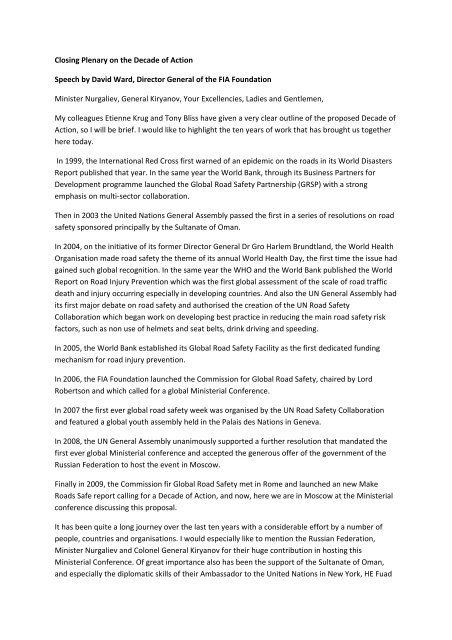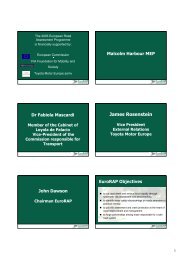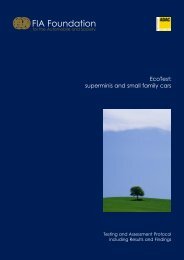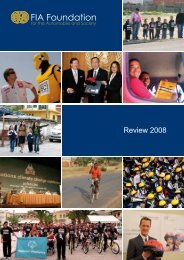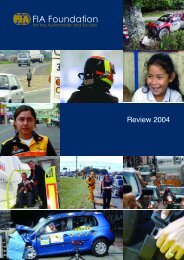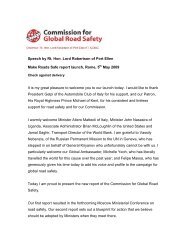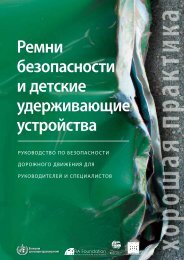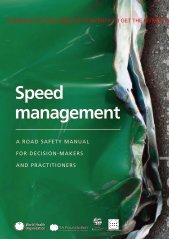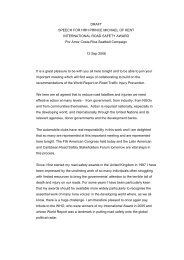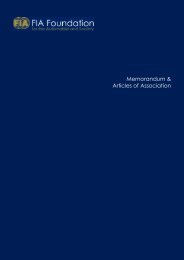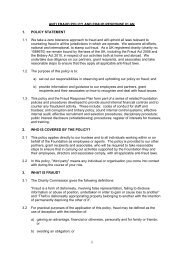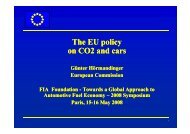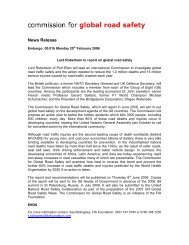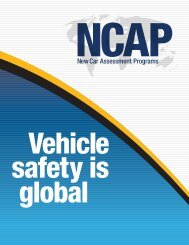Download David Ward's Speech to the Closing ... - Make Roads Safe
Download David Ward's Speech to the Closing ... - Make Roads Safe
Download David Ward's Speech to the Closing ... - Make Roads Safe
Create successful ePaper yourself
Turn your PDF publications into a flip-book with our unique Google optimized e-Paper software.
<strong>Closing</strong> Plenary on <strong>the</strong> Decade of Action<strong>Speech</strong> by <strong>David</strong> Ward, Direc<strong>to</strong>r General of <strong>the</strong> FIA FoundationMinister Nurgaliev, General Kiryanov, Your Excellencies, Ladies and Gentlemen,My colleagues Etienne Krug and Tony Bliss have given a very clear outline of <strong>the</strong> proposed Decade ofAction, so I will be brief. I would like <strong>to</strong> highlight <strong>the</strong> ten years of work that has brought us <strong>to</strong>ge<strong>the</strong>rhere <strong>to</strong>day.In 1999, <strong>the</strong> International Red Cross first warned of an epidemic on <strong>the</strong> roads in its World DisastersReport published that year. In <strong>the</strong> same year <strong>the</strong> World Bank, through its Business Partners forDevelopment programme launched <strong>the</strong> Global Road <strong>Safe</strong>ty Partnership (GRSP) with a strongemphasis on multi‐sec<strong>to</strong>r collaboration.Then in 2003 <strong>the</strong> United Nations General Assembly passed <strong>the</strong> first in a series of resolutions on roadsafety sponsored principally by <strong>the</strong> Sultanate of Oman.In 2004, on <strong>the</strong> initiative of its former Direc<strong>to</strong>r General Dr Gro Harlem Brundtland, <strong>the</strong> World HealthOrganisation made road safety <strong>the</strong> <strong>the</strong>me of its annual World Health Day, <strong>the</strong> first time <strong>the</strong> issue hadgained such global recognition. In <strong>the</strong> same year <strong>the</strong> WHO and <strong>the</strong> World Bank published <strong>the</strong> WorldReport on Road Injury Prevention which was <strong>the</strong> first global assessment of <strong>the</strong> scale of road trafficdeath and injury occurring especially in developing countries. And also <strong>the</strong> UN General Assembly hadits first major debate on road safety and authorised <strong>the</strong> creation of <strong>the</strong> UN Road <strong>Safe</strong>tyCollaboration which began work on developing best practice in reducing <strong>the</strong> main road safety riskfac<strong>to</strong>rs, such as non use of helmets and seat belts, drink driving and speeding.In 2005, <strong>the</strong> World Bank established its Global Road <strong>Safe</strong>ty Facility as <strong>the</strong> first dedicated fundingmechanism for road injury prevention.In 2006, <strong>the</strong> FIA Foundation launched <strong>the</strong> Commission for Global Road <strong>Safe</strong>ty, chaired by LordRobertson and which called for a global Ministerial Conference.In 2007 <strong>the</strong> first ever global road safety week was organised by <strong>the</strong> UN Road <strong>Safe</strong>ty Collaborationand featured a global youth assembly held in <strong>the</strong> Palais des Nations in Geneva.In 2008, <strong>the</strong> UN General Assembly unanimously supported a fur<strong>the</strong>r resolution that mandated <strong>the</strong>first ever global Ministerial conference and accepted <strong>the</strong> generous offer of <strong>the</strong> government of <strong>the</strong>Russian Federation <strong>to</strong> host <strong>the</strong> event in Moscow.Finally in 2009, <strong>the</strong> Commission fir Global Road <strong>Safe</strong>ty met in Rome and launched an new <strong>Make</strong><strong>Roads</strong> <strong>Safe</strong> report calling for a Decade of Action, and now, here we are in Moscow at <strong>the</strong> Ministerialconference discussing this proposal.It has been quite a long journey over <strong>the</strong> last ten years with a considerable effort by a number ofpeople, countries and organisations. I would especially like <strong>to</strong> mention <strong>the</strong> Russian Federation,Minister Nurgaliev and Colonel General Kiryanov for <strong>the</strong>ir huge contribution in hosting thisMinisterial Conference. Of great importance also has been <strong>the</strong> support of <strong>the</strong> Sultanate of Oman,and especially <strong>the</strong> diplomatic skills of <strong>the</strong>ir Ambassador <strong>to</strong> <strong>the</strong> United Nations in New York, HE Fuad
Mubarak Al Hinai. Naturally I wish <strong>to</strong> recognise <strong>the</strong> tireless work of Lord Robertson for <strong>the</strong>Commission for Global Road <strong>Safe</strong>ty, and Michelle Yeoh for her fantastic contribution as <strong>the</strong>ambassador for <strong>the</strong> <strong>Make</strong> <strong>Roads</strong> <strong>Safe</strong> campaign. I would also like <strong>to</strong> thank Dr Etienne Krug and histeam at <strong>the</strong> WHO, Tony Bliss and his team at <strong>the</strong> World Bank Global Road <strong>Safe</strong>ty Facility, and, ofcourse, my own very dedicated team at <strong>the</strong> FIA Foundation. All have played a crucial role in ensuring<strong>the</strong> success of this Ministerial Conference.This ten year effort means that <strong>the</strong> Decade of Action has been very well prepared. We have <strong>the</strong>necessary institutional structure, <strong>the</strong> policy recommendations, and a mandate from <strong>the</strong> UN. Weknow what works in road injury prevention and we are sure that <strong>the</strong> Decade of Action will bringpositive results.What is particularly significant about this Conference is that compared <strong>to</strong> many o<strong>the</strong>r difficult globalissues we are united. In Copenhagen in a few weeks a climate change summit will be held and weknow that, perhaps not surprisingly, countries remain divided and <strong>the</strong>re are some major issues <strong>to</strong>resolve. But here in Moscow we do not have such problems. There is a consensus about what needs<strong>to</strong> be done. And what better issue for us <strong>to</strong> work <strong>to</strong>ge<strong>the</strong>r than saving lives? We have <strong>the</strong> chance <strong>to</strong>make road safety an example of international co‐operation at its best, and <strong>the</strong> United Nations at itsbest.What we need most and <strong>the</strong> point I want <strong>to</strong> highlight <strong>the</strong> most is political will. Road safety worksbest when <strong>the</strong>re is clear political support from leaders in government. That is why this Ministerial isso important as a ga<strong>the</strong>ring of leaders. The Moscow Conference is a political event and <strong>the</strong> MoscowDeclaration a political statement of intent.I would like <strong>to</strong> highlight <strong>the</strong> role of political leadership on a more personal note. I am myself a kind ofroad safety success s<strong>to</strong>ry. When I was eighteen I was a passenger in a Mini that was involved in avery bad head on collision. I survived <strong>the</strong> crash because I was wearing a seat belt. I wore my belt fortwo reasons. In <strong>the</strong> late 1960s <strong>the</strong> UK Minister of Transport, Barbara Castle, a predecessor ofMinster Paul Clarke who is here on our panel <strong>to</strong>day, promoted <strong>the</strong> 1967 Road Traffic Act. Thisrequired fitting of seat belts in cars for <strong>the</strong> first time. Barbara Castle had <strong>to</strong> fight for <strong>the</strong> legislationagainst opposition from some members of <strong>the</strong> Cabinet who felt seat belt laws would threaten ourcivil liberties! But she fought her point and won and that’s why <strong>the</strong>re were seat belts in <strong>the</strong> Mini Iwas travelling in. And <strong>the</strong> second reason I wore my belt was a very effective awareness campaigncalled ‘clunk click every trip’. It was <strong>the</strong>se two actions, seat belt laws and an awareness campaignthat that made me use <strong>the</strong> belt which saved my life. It was political leadership that helped mesurvive and enabled me <strong>to</strong> be here <strong>to</strong>day and also my daughter who is working on <strong>the</strong> <strong>Make</strong> Road<strong>Safe</strong> stand outside this hall.My experience is just one example of how political leadership can save <strong>the</strong> lives of literally millionsof people that we will never know. You, <strong>the</strong> Ministers here <strong>to</strong>day have <strong>the</strong> opportunity <strong>to</strong> takedecisions that will benefit those millions of your fellow citizens. You can take action that will prevent<strong>the</strong> disastrous impact that road crashes have on millions of families. You can help avoid <strong>the</strong> tragicloss of life, and lifelong disability. That is <strong>the</strong> opportunity of <strong>the</strong> Decade of Action. Let’s work<strong>to</strong>ge<strong>the</strong>r <strong>to</strong> make it happen. Thank you very much.


